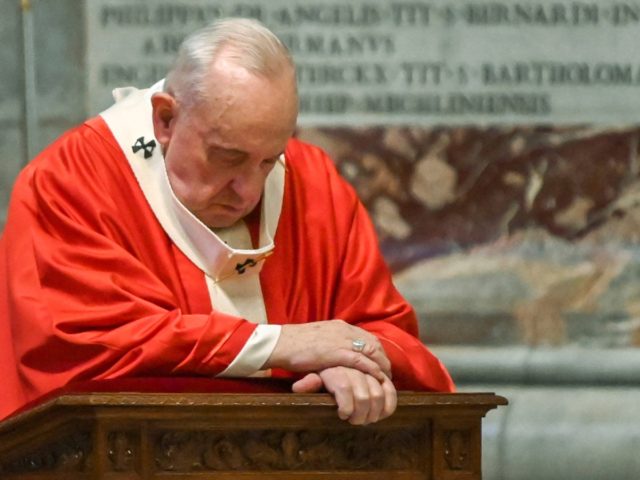ROME — Pope Francis devoted much of his Easter blessing on Sunday to the coronavirus pandemic, insisting that now is a time for unity, solidarity, and hope.
In his “Urbi et Orbi” blessing, the pope first addressed those directly affected by the coronavirus — the sick and family members who mourn the loss of their loved ones — asking “the Lord of life” to welcome the departed into his kingdom and to grant comfort and hope to those still suffering, “especially the elderly and those who are alone.”
“For many, this is an Easter of solitude lived amid the sorrow and hardship that the pandemic is causing, from physical suffering to economic difficulties,” he said via live-streaming. “This disease has not only deprived us of human closeness, but also of the possibility of receiving in person the consolation that flows from the sacraments, particularly the Eucharist and Reconciliation.”
“The Lord has not left us alone!” Francis said. “United in our prayer, we are convinced that he has laid his hand upon us, firmly reassuring us: Do not be afraid, ‘I have risen and I am with you still!’”
The pontiff also underscored the sweeping nature of the pandemic, since everyone has been affected by the lockdown measures that have radically changed people’s way of living.
“In these weeks, the lives of millions of people have suddenly changed,” he said. And while for some remaining at home has been an opportunity to reflect away from the frenetic pace of life, for many, “this is also a time of worry about an uncertain future, about jobs that are at risk and about other consequences of the current crisis.”
“This is not a time for indifference,” he continued, “because the whole world is suffering and needs to be united in facing the pandemic.”
The pope also called for a relaxing of international sanctions, “since these make it difficult for countries on which they have been imposed to provide adequate support to their citizens,” while also calling for a reduction of “the debt burdening the balance sheets of the poorest nations.”
In the midst of his address, the pope reasserted his support for the European Union, urging member states to see themselves as “part of a single family.”
“The European Union is presently facing an epochal challenge, on which will depend not only its future but that of the whole world,” he said. “Let us not lose the opportunity to give further proof of solidarity, also by turning to innovative solutions. The only alternative is the selfishness of particular interests and the temptation of a return to the past, at the risk of severely damaging the peaceful coexistence and development of future generations.”
“This is not a time for self-centeredness, because the challenge we are facing is shared by all, without distinguishing between persons,” he said.
As is his custom, the pope also took public inventory of areas of the world where suffering is particularly intense, asking for prayers for all of them.
In this, he specifically mentioned Syria, Yemen, Iraq, Lebanon, Israel, Palestinians, Ukraine, African countries, Mozambique, Libya, Greece, Turkey, and Venezuela. As on other occasions, he refrained from mentioning ongoing strife in Hong Kong.
The world is “faced with epochal challenges and now oppressed by a pandemic severely testing our whole human family,” he said. “In this night, the Church’s voice rings out: ‘Christ, my hope, is risen!’”
“May Christ, who has already defeated death and opened for us the way to eternal salvation, dispel the darkness of our suffering humanity and lead us into the light of his glorious day, a day that knows no end,” he concluded.

COMMENTS
Please let us know if you're having issues with commenting.